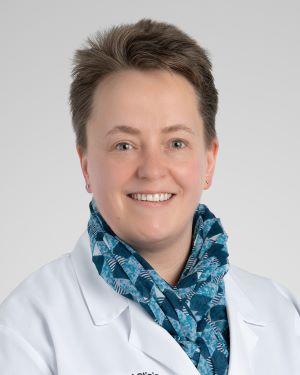Andrea Schlegel Laboratory
-
Andrea Schlegel Laboratory
- Principal Investigator
- Research
- Our Team
- Publications
- Research News

Andrea Schlegel, MD, MBA
Associate Staff
Email: [email protected]
Location: Cleveland Clinic Main Campus
Research
The Andrea Schlegel lab studies the role of mitochondria in organ transplantation.
Our research group has an established perfusion laboratory where we apply different perfusion techniques to treat and analyze organs for transplantation. We study the role of mitochondria in transplantation and other diseases.
The main focus of our projects is on:
- Mitochondrial injury and function in organ transplantation
- Viability assessment of organs before transplantation using mitochondria-derived biomarkers
- The impact of Complex I and II function on outcomes after transplantation
- The link between mitochondrial injury, intra-allograft inflammation and innate immune response
- The impact of early mitochondrial injury after transplantation on recipient disease recurrence
Biography
Dr. Andrea Schlegel is an academic transplant surgeon at Cleveland Clinic specialized in liver transplantation and hepatobiliary surgery. Dr. Schlegel’s interests include both, experimental and clinical research with a focus on organ preservation to improve the utilization of human organs. To ensure utmost safety for transplant recipients, Dr. Schlegel’s lab explores underlying mechanisms of mitochondrial injury and protection throughout the entire journey of an organ from the donor to the recipient.
Dr. Schlegel obtained her medical degree with Honors from the Justus-Liebig-University Giessen (Germany). She completed her research fellowship and residency at the University Hospital Zurich (Switzerland), where she also served as Chief Resident and Staff Surgeon with a focus on quality improvement and patient safety in abdominal surgery and transplantation. She went on to complete her Transplant Surgery and Hepato-Pancreatico-Biliary Surgery fellowship training at Queen Elizabeth University Hospital Birmingham (United Kingdom) and was awarded with a Staff position as Transplant Surgeon before moving to Italy (Careggi Hospital Florence and Milan Policlinico), where she achieved the “National Scientifica Qualification” as Full Professor (06/C1 - General Surgery).
Since 2011 her research is focused on a broad range of topics including dynamic organ preservation in context of transplantation, the development of new markers to predict organ viability, and underlying mechanisms of ischemia and reperfusion injury triggered by mitochondrial injury and dysfunction.
Dr. Schlegel serves as Associated Editor and Reviewer in more than 15 leading journals in the field of surgery and transplantation and has various international collaborations worldwide with an average number of 20 invited lectures and presentations per year.
Dr. Schlegel is board certified in General Surgery (FMH), Transplant Surgery (EBSQ/UEMS) and Hepato-Pancreatico-Biliary Surgery (EBSQ/UEMS) and obtained a Master in Business Administration (MBA, specialized in International Healthcare Management) from the Robert Kennedy College (Switzerland) and University of Cumbria (United Kingdom).
Education & Professional Highlights
Fellowship – National Center for Child Health and Development
Pediatric Liver Transplantation Surgery
Tokyo, Japan 2019
Fellowship – Queen Elizabeth University Hospital Birmingham
Transplantation Surgery and Hepato-Pancreatico-Biliary Surgery Birmingham
United Kingdom 2017
Residency – University Hospital Zurich
Abdominal and Transplant Surgery
Zurich, Switzerland 2015
Research Fellowship – University Hospital Zurich
Abdominal and Transplant Surgery (Swiss HPB Center)
Zurich, Switzerland 2012
Medical Education – Justus-Liebig-University Giessen
Doctor of Medicine
Giessen, Germany 2007
Certifications
General Surgery
Transplant Surgery
Hepato-Pancreatico-Biliary Surgery
Research
With an increasing number of candidates on the waiting lists and a worldwide lack of suitable donors there is an urgent need to better understand biological mechanisms underlying the inflammatory features leading to organ dysfunction and recipient complications.
Mitochondria are the key players in various biological processes, including inflammation, cancer development and ageing. Such powerhouses of all mammalian cells are the main reason why solid organ transplantation is a success.
With the increasing use of marginal organs for transplantation, the challenges of static cold storage (“ice box”) preservation are increasingly evident today. In addition to the time pressure to “quickly implant” an organ, there is no opportunity to treat organ injury or assess function during static cold storage. Machine perfusion is therefore a hot topic in the field and currently available techniques, i.e., hypothermic oxygenated and normothermic perfusion are explored for their mechanisms in our lab. Despite extensive research, no real-time viability test is currently available worldwide to reliably identify organs that will fail in the short or longer term after transplantation.
My laboratory investigates the mechanisms by which mitochondria contribute to success and failure of transplantation through ischemia-reperfusion injury, intra-allograft inflammation and immune system activation with related graft loss. To increase the number of organs with appropriate immediate function we are focusing on the development of new viability tests applied before decision making to accept or decline a specific donor organ. Based on our large clinical transplant program at Cleveland Clinic we have the unique opportunity to explore novel mechanisms in the laboratory with direct transfer to clinical practice of organ perfusion and transplantation. Identifying the mechanisms by which the dysfunctional mitochondrial respiration before transplantation affects the downstream organ inflammation after transplantation is key to design new treatments and technologies that will have a significant impact on the well-being of both, pediatric and adult organ recipients.
Our Team
Selected Publications
View publications for Andrea Schlegel, MD, MBA
(Disclaimer: This search is powered by PubMed, a service of the U.S. National Library of Medicine. PubMed is a third-party website with no affiliation with Cleveland Clinic.)
See publications of Andrea Schlegel and her team on PubMed.
Research News

Dr. Andrea Schlegel leads human organ transplant research investigating the critical role of mitochondria in evaluating long-term graft viability.